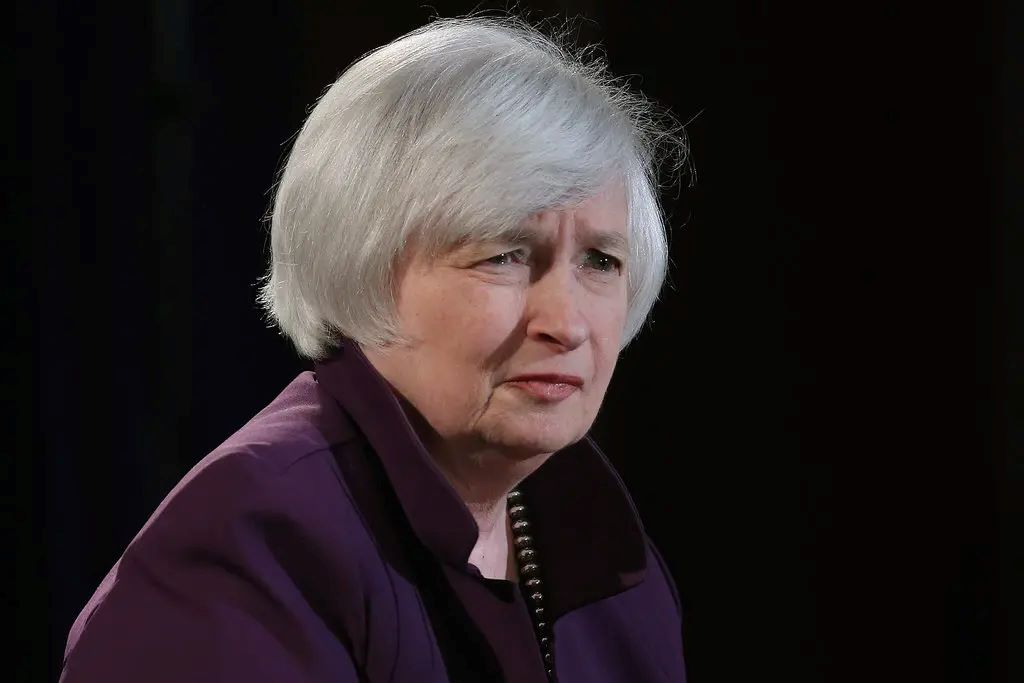Treasury Secretary Janet Yellen emphasized that the long-term forecast of elevated interest rates presents challenges in handling US borrowing needs. This underscores the urgency of bolstering revenue, a point she discussed with Republican lawmakers. Speaking in an interview with Bloomberg News on Friday, Yellen emphasized the need for fiscal prudence amidst changing economic conditions.
Elevated Interest Rates Complicate Deficit Control
“We’ve raised the interest-rate forecast,” Janet Yellen remarked according to Bloomberg report. “That does make a difference. It makes it somewhat more challenging to keep deficits and interest expense under control.” Her comments highlight the growing fiscal pressures facing the government as it navigates an environment of rising borrowing costs.
Janet Yellen referred to the Biden administration’s budget proposals, which she asserted are designed to keep the nation on a sustainable fiscal path. A key metric in these discussions is the ratio of inflation-adjusted interest payments compared to GDP. This ratio surged in the past year, but the White House expects it to stabilize at around 1.3% over the next decade.

U.S. Treasury Secretary Yellen Stresses Urgency in Accessing Frozen Russian Assets for Ukraine Aid
In a press briefing held in Frankfurt, Germany, U.S. Treasury Secretary Janet Yellen reiterated the imperative need to access frozen Russian assets for the benefit of Ukraine.
Fiscal Benchmarks and Projections
“I don’t have a hard-and-fast rule, but I would not like to see it drift above 2%,” Janet Yellen stated, in her most specific comments yet on this benchmark. Previously, she noted that the administration’s forecasts anticipated “historically normal” debt costs. This target aims to ensure that rising interest payments do not overwhelm the federal budget.
However, economists at Goldman Sachs Group Inc. have a more pessimistic outlook. Their latest analysis, unveiled on Wednesday, forecasts that the ratio will surpass this threshold. They anticipate net real interest payments to climb to 2.3% by 2034. This is a significant increase from their forecast five years ago, which was at 1.5%.
Impact of Rising Interest Rates
A significant factor in the deteriorating outlook is the rise in interest rates. The Federal Reserve began raising rates aggressively in 2022 to combat inflation, increasing the cost for the government to service its debt. This policy shift has made it more challenging to maintain fiscal discipline.
In its most recent annual budget proposal, the White House projected 10-year Treasury yields to hit 3.7% in the early 2030s. This is nearly a full percentage point higher than the 2.8% forecasted in its proposal three years prior. Treasury-bill rates, which closely follow the Fed’s benchmark rate, have increased by about half a percentage point in these long-term projections.
Revenue Enhancement and Deficit Reduction
“We have included a lot of deficit reduction measures in the budget in order to keep the interest expense at a level that we think is fiscally responsible,” Yellen said. She delivered these remarks during a discussion with Bloomberg News in Stresa, Italy. This conversation took place on the sidelines of a Group of Seven meeting attended by finance ministers and central bank governors.
Yellen’s remarks underscore the administration’s strategy to manage fiscal challenges by boosting revenue and implementing deficit reduction measures. This approach aims to mitigate the impact of higher interest rates and ensure long-term fiscal sustainability.
Receive the daily delivery of The WSJ Print Edition right to your home or office for a full 52 weeks. This subscription covers Monday through Saturday, ensuring you receive your newspaper every morning. Plus, you’ll enjoy uninterrupted WSJ digital access, providing 24/7 availability to our online news platform, featuring the latest daily news, live WSJ TV, engaging audible articles, and access to our extensive news archives.

